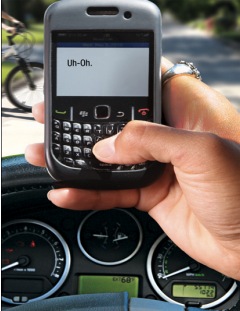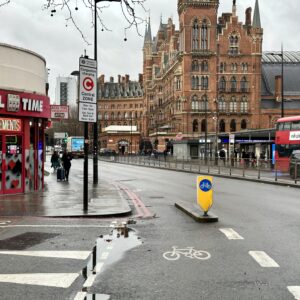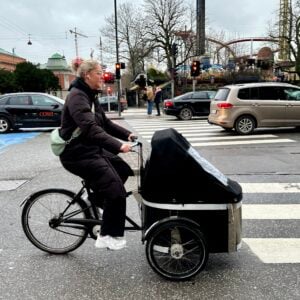
One of the things I spend time on everyday is monitoring headlines. I liken this part of my job to a military intelligence officer listening to “chatter” from satellites and other broadcast signals. It’s fascinating to watch various memes and issues go from a tiny whisper to a roar in a matter of hours. Another thing I try to watch for is how the same issue is spun in different ways.
In the past day or so, distracted driving has been on my mind (it actually never leaves my mind) and I’ve noticed several interesting headlines about it. Then this morning, a major regional transit agency put out a message about “distracted walking”. With all this chatter, I figured it was time to talk about this issue again.
In his most recent column titled, How do we curb our careless obsession with cell phones in cars? Oregonian columnist Steve Duin made it clear that he is concerned about this dangerous epidemic. In his piece, Duin points to the toothless penalties the currently exist in Oregon law for people caught using phones while driving. He also points out the vast gap in severity of punishment between drunk driving and distracted driving, event though it could be argued that, “the latter is far more hazardous to your judgment and reaction times”. Not only that, I’d add, but unfortunately distracted driving is far more common and socially accepted than drunk driving.
Duin’s column is good and I’m glad he’s concerned about this issue. As he points out though, enforcement and “tougher” laws isn’t making much of a dent in this dangerous activity. We need a change in culture where respect for the safety of other people is greater than the selfish habit of checking a phone when attention should be kept on the road. And since culture change takes so long, we can only hope that new technology helps the problem and that cities and states get serious about creating more physically protected bike lanes.
Speaking of infrastructure and creating more urgency from politicians and bureaucrats, Streetsblog analyzed new research that shows people walking and biking are getting hurt and killed at increasing rates due to distracted driving. Here’s an excerpt:
Pedestrian deaths attributable to distracted driving rose from 344 in 2005 to 500 in 2010, significantly faster than overall population growth. Annual bicyclist deaths caused by distracted driving rose from 56 to 73 over the same period. Together pedestrians and bicyclists accounted for about one in 10 traffic fatalities that resulted from distracted driving, researchers found.
Those stats, combined with the obvious reality that can be seen on the roads every day, should be all that elected officials need to prioritize this issue.
The Streetsblog story also quoted one of the study’s authors who said, “Evidence suggests that separating non-motorized travel from motorized travel, through bike lanes or other redevelopment efforts, could greatly reduce deaths.” Reading that, I couldn’t help but think about PBOT’s proposal for a major redesign of SE Foster Road that provides zero protection for bike riders.

And the final headline that I wanted to share this morning comes from our regional public transit agency, TriMet. Within hours of Streetsblog pointing out a rise in carnage caused by distracted driving, TriMet issued a news statement that began with the words, “As concerns about ‘distracted walking’ increase…” The purpose of TriMet’s statement was to share more about the audible turn-warning systems they’ve been testing.
It’s clear from TriMet’s messaging that they are trying to establish a particular narrative around distracted road use. Here’s an excerpt (emphases mine):
This demonstration comes at a time when “distracted walking” is beginning to draw as much attention as distracted driving. A nationwide study by Ohio State University released this summer found that injuries related to using a cell phone while walking more than doubled from 2005 to 2010 and, if trends continue, the number of injuries will double again between 2010 and 2015.
For drivers, including our bus and train operators, distracted walkers have become a common sight in busy pedestrian areas such as downtown Portland. They often are so engrossed in their electronic devices they do not pay attention to the traffic around them. Last year, University of Washington researchers found walkers who were texting were four times less likely to look before crossing streets, stay in crosswalks or obey traffic signals.
No matter what side of the windshield you’re on, what all these headlines tell me — especially when combined with what we all see with our own eyes every single day — is that distracted driving is a major issue. It could be the most urgent and important traffic safety issue we face today. With the absence of former US DOT Secretary Ray LaHood’s all-out assault on distracted driving, I’m worried that our elected officials and transportation leaders have allowed this issue to be put on the back-burner.
Anyone who makes the oft-repeated claim that “safety is our top priority when it comes to transportation” must do more to address distracted driving. When it comes to solutions, we need an all-of-the-above approach because of all the issues I think about, the alarming number of people who take their eyes off the road to use their phones while driving, is the one that concerns me the most.







Thanks for reading.
BikePortland has served this community with independent community journalism since 2005. We rely on subscriptions from readers like you to survive. Your financial support is vital in keeping this valuable resource alive and well.
Please subscribe today to strengthen and expand our work.
It seems like the culture is headed towards phones being accepted at all times, people leave them on the table at meetings, looking at them while talking to you, etc. It seems hard to break that habit, not just in cars or while walking. My only idea is that it becomes a mandated routine. You get in your car, buckle your seat belt and put your phone in the armrest/glove box(?)
There’s zero incentive to do that. You can’t change human behavior without incentive.
You can’t change American behavior without making it more convenient.
Americans hate inconvenience, as a general rule.
Or, there’s always the guerrilla approach: http://www.phonejammer.com/home.php?cat=249
I see these cannot be sold to the US. Is this something I should look at buying on my next trip to Canada?
A phone jammer has the unintended impact of a driver trying to troubleshoot a condition they aren’t used to (lack of signal) instead of focus on the road.
In other words, I would bet you $$$ it would make you much more at risk.
All cars should be required to have automatic crash avoidance systems. I wish the bike lobbying community would go all in on requiring these safety systems and push for self driving cars. It’s going to happen but sooner than later can save a lot if lives. Imagine biking in a world where every car automatically sees you and drives accordingly. People simply will not stop their distracting behaviors.
Reminds me of the BART train where the guy pulled a gun out and waved it around and nobody noticed it until he shot someone in the head… why is it so hard to pay attention to your surroundings?
those people could have had their heads buried in newspapers or books with the same results as iphones
Well, at least in that case, they were riding a train, not piloting a 4000lb vehicle down a busy street.
Perhaps a different angle: “Distracted driving increases congestion and lengthens commute times.”
I noticed this the other day when I observed a woman reading a book while driving her Volvo down Prescott. She left a huge gap in front of her car and caused several people behind her to miss the green light at Prescott and 82nd. Distracted drivers do not drive efficiently. They leave large gaps and make unpredictable moves. They also increase the likeliness of collisions, which obviously create congestion. Perhaps the movement would get more traction with this angle?
“We need a change in culture where respect…”
Respect being the key word here.
Since we are obviously an idiotic, selfish populace that can’t be entrusted with the safe operation of vehicles, maybe the “gubbament” needs to actually step in and do something effective.
But here’s the thing, punitive measures aren’t working.
So…
Make it a contest? Like the recent “drive less challenge” ODOT just set up. Enter in every trip where you didn’t check your phone, submit that data on a state website and then be automatically entered in a contest to win a gift card to Walmart, a free Chalupa, Subway, Big gulps or football tickets or something.
Federal and state Safe Driving Tax Rebate?
<oops>
… Below 15mph… (not above)
</oops>
My own headline monitoring is leading me to believe we are closing in on the day where distracted driving is regarded as a total faux pas. I am much more in favor of crowd-sourcing solution here (speaking up as a passenger being the easiest way) than anything technological. Can we get some old fashioned PSAs, delivered through new fangled media (Hulu, Netflix, etc.)? I totally remember similar ones from back in the day regarding drunk driving. And littering. They eventually worked, and at a relatively low cost.
I’ve noticed that motorcycle cops do the best job of nailing drivers on cell phones. Yesterday I was riding through Cupertino and saw a Sheriff pull over two different cars at the same time for this. I’ve even seen CHP sneak up in highway traffic and lecture a guy in front of us who was ridiculously erratic. From what I’ve seen cops take this seriously, but it really is bigger than they can handle.
Speaking of PSAs… does anyone know if there are bike jerseys with this message on them?
Ooh, I like the “Text & Wreck” graphic…
http://www.distraction.gov/content/get-involved/downloads.html
Why so little apparent support for a technological solution? Crash avoidance systems and self driving cars are on the road now (and operating with amazing safety and efficiency). Cajoling irresponsible drivers is not going to work but making car systems themselves safer is a win for everyone. If the bike community was really dedicated to making the roads safe for the “8-80” set, this is the way to actually realize that goal. Right?
Yes, let Skynet run everything.
The tipping point will come when self-driving technology is cheap and effective enough to save insurance companies significant money, then they’ll pressure Congress to pass mandates and the “human condition” will no longer apply to drivers. If Google has its way you’ll then be able to use your travel time to browse and shop online without distraction.
In Japan in many districts it is illegal to walk/bike while smoking or using a cell phone. The important part is that people mostly seem to follow this rule. They may stand still and talk, or stop with their bike and talk. The reason for the law is to not be rude toward others.
Phones are a problem, but people and how they use them are also a problem.
I think there should be more fear about driving in general, and about respect. As a bicyclist I certainly worry about dying more, and when i drive i really worry about killing someone. Although i think i can handle being on my phone and biking, I dont, with respect to others around me. Maybe we should all be more concerned with the others moving around us.
Preaching to the choir….
I was biking home on Interstate a couple of evenings ago and the guy ahead of me thought he could bike and text. he was weaving all over the place, including about 4′ outside the bike lane with me coming alongside him and a prius behind me! EVERYONE thinks they can handle it, that is a big part of the problem.
Disagree – the more responsibility is given to technology the less persons will be accountable. . Kill a cyclist, blame the car and go on with your day, but good luck suing Toyota for hitting a pedestrian. Training, and tough licensing and tough penalties for PERSONS who are ultimately responsible.
Where else have we given more responsibility to safety systems? Basically everywhere. Air traffic control systems are automated for instance. Your ABS and traction control systems are far superior to comparable human efforts. Numerous other examples which make us safer in many ways every day. I know people are fixated on the ethics issue here which is important but I only see one system that is absolutely proven to save many lives. Isn’t that the main point here? To put it another way, if automated driving systems were in place right now and roadway fatalities were reduced 90% would anyone argue for a return to the good old days we are witnessing now? I’m tired of reading about all these pointless deaths EVERY SINGLE DAY. It blows my mind that we could prevent the vast majority of these injuries and deaths simply by implementing technology we ALREADY HAVE. I find it surprising that the bike community as a whole seem to regard this potential development with a giant, MEH.
So the solution to distracted drivers it to facilitate their distraction!?
Yes. It may not feel satisfying morally somehow but that’s not the point. It is safer. For drivers, bikers, walkers, etc. This proposal mitigates dangerous behavior by placing safety in a system that can automatically see you and make corrective actions regardless of the attention of the driver. Imagine your phone or other device in constant communication with a cars system. No more blind curves, no hooks, no drifting into your lane. When I think of the near misses I’ve been involved in virtually every single one was due to human driver error.
Just like cycling or motorcycling give persons a sense of freedom, so driving gives many people that sense of freedom. Expect angry pushback trying to take that away from them. I can already hear the “Drivers Rights” advocates railing against the nanny state. Persons who enjoy driving (or who dislike government intervention) will opt out of the technology Impoverished drivers will use cars that don’t have the technology. You claim that the technology for self-driving cars is infallible, but just as you claim that all roadway “fails” are human error, where is it demonstrated that computers (which will be driving the cars) are infallible? Ever heard of Windows? My fruitless hope to require more vigorous training for drivers, to step up enforcement of laws and to enact meaningful penalties for violators requires people be responsible for their behavior. It directs people to serve their better angles rather than absolving people of ignoring them. So yes, your option is morally distasteful.
Meanwhile you profess that the right thing to do is remove responsibility from people for the vehicles in their direct charge because government mandated computer control is superior to personal accountability. OK then, good luck with that.
I think the point is that we have essentially achieved all that we can through vehicle design. It is extremely rare that a mechanical failure causes a collision anymore. We need to remove the final element of traffic collisions: the driver.
Now with so many people relying on their cell phones for navigation its getting worse.
Or it’s getting better. Many navigation tools will automatically reroute for high-impact traffic events, clearing roads much faster than before, which might be reducing traffic conditions conducive to hitting people.
It is time for periodic random beatings of phone-using drivers by police.
Drivers are a top-of-the-foodchain predator with no natural enemies.
They fear nothing. It is the job of police to give drivers something to fear.
I was referred (I think by BikePortland) to an article recently that discussed whether self-driving cars would be good or bad for cycling. One very interesting unintended consequence of having cars that can sense and automatically avoid hitting peds and cyclists, is that it could possibly embolden said vulnerable users to step/ride out in front of cars, knowing they will auto-stop to avoid hitting them. If such behavior became common, there could then be a backlash against these “arrogant” peds/cyclists such that they could face harsher penalties for “jaywalking” or be banned from riding on certain roads where “drivers” were frustrated at their cars’ constant auto-avoidance of erratic cyclists. Separation would become *required* before riding could be allowed back onto (beside) a street. Rather than creating a safety paradise, it could create an even more tyrannical reign by automated motor vehicles…
On “distracted walking”: I make a habit of making sure to be fully aware and prepared to make eye contact with anyone crossing my path whenever I enter a crosswalk. And that includes holding my phone down at my side and not merely looking up from it, so if there happens to be a confrontation it will be clear I am NOT looking at my phone. That said, I read a book or newspaper on my phone while walking on the sidewalks of Portland and Beaverton all the time. And before I had my phone I did that with a physical book or newspaper. Anyone who tells me I can’t read while on a deserted sidewalk is going to have a fight on their hands.
For the most part, the “distracted walking” thing is just a misplaced attempt by drivers to justify their own distracted behavior. They are NOT ANALOGOUS. Distracted walking is, at worst, rarely more than annoying to those whose paths cross the distracted walker’s. Distracted driving is patently irresponsible and lethal, potentially as bad or worse than drunk driving.
I am not AT ALL convinced that self-driving cars or crash-avoidance systems will be beneficial.
When I learned to drive back in the 80s, driving was well-known to be a dangerous activity (as depicted in numerous lurid Drivers Ed videos) and everyone knew they had a pretty good chance of ending up dead if they got in a major crash. Safety was seen as the responsibility of the DRIVER, not the vehicle.
Over the past few years, as vehicles have gotten so much safer – better both at avoiding crashes and drastically reducing the likelihood of being killed in a major crash – most people now expect their car to protect them. This is IMO the major reason people drive much faster, more aggressively and more carelessly than they used to. Safety is no longer the responsibility of the driver, but the VEHICLE.
Now we’re seeing a new wave of safety systems on luxury cars – adaptive cruise, blind spot detection, lane departure warning, and soon pedestrian and cyclist avoidance – that further remove drivers from the task of driving. In theory these improve safety (and pedestrian/cyclist avoidance FINALLY gives us a system that protects people who aren’t in the vehicle), but I think they just insulate people more from having to pay attention to their driving. Until we genuinely get self-driving cars I’m not sure these systems will make uncaged road users better off.
And when will we REALLY have self-driving cars? Driving is an incredibly complex task. I know the technology is progressing rapidly, and I think we will see it reach production cars within my lifetime. But:
1. That is still a few years off. There are a lot of bugs to be worked out before these systems will work well enough in the huge range of real-world situations, on imperfect real-world roads, to be relied upon instead of human drivers.
2. The technology will initially be expensive, available only on very expensive cars, and will take quite a while to trickle down to entry-level NEW cars. Historically it has taken 10-20 years after a safety technology begins to appear on production cars (examples: airbags, stability control, ABS) before it becomes mandatory.
3. What about used cars? Used cars ALWAYS been grandfathered in and exempted from new safety requirements (examples: seatbelts, turn signals prior to that, and pretty much everything else). So even when all new cars are required to be self-driving, used cars won’t be.
4. Used cars stick around for a long time. The average age of vehicles on American roads is currently 11.4 years, and there’s still a sizable population of 20-year-old cars on the road.
Bottom line: it will be at least 2050, possibly quite a bit later, before self-driving cars completely replace human-driven cars and we no longer have to worry about being crushed by automobiles. My kids will probably see the day when it happens (assuming they aren’t crushed by automobiles themselves in the meantime), but as a middle-aged person I’m not sure that I will.
Meanwhile, we need to do something about distracted driving NOW! I’m not willing to wait that long, and watch tens of thousands of cyclists and pedestrians die unnecessarily due to irresponsible smartphone use.
All good points, Jonathan.
I’m weirded out by the TriMet statement saying we need to listen to their talking buses.
“For drivers, including our bus and train operators, distracted walkers have become a common sight in busy pedestrian areas such as downtown Portland.”
Um. Okay. But I’m a little uncomfortable with the “get out of my way!” voice message that I’m getting from the bus. If there’s a pedestrian in the way, distracted or not, the bus has no business turning.
Ted Buehler
I find it odd that bike riding people seem to think bike riders would not be safer if we mandated safer vehicle operating systems. There’s a ton of evidence already that these systems work very well. If you’re opposed to the adoption of this technology I have to wonder just how high the stakes would have to be to change your mind. If it saved thousands of lives annually is that statistic compelling enough or not really? The auto industry is very competitive and if all makers had to comply with the mandate sheer scale prices for the feature would be very low. As example the new VW golf in Europe employs an avoidance system and costs nearly identical to its predecessor. It also saves the driver money as it costs far less to insure. We could do this right now if people demanded it.
More people love cars than love guns. There is no threshold high enough to wrest steering wheels from their hands
Its interesting Jonathan that the first time I saw you in person was when you were trying to bike and take photos at the same time creating a hazard to those in the bike lane (this was on broadway bridge when they had it reduced to a single side for repair). It is a large problem but you are acting quite hypocritical at the moment as with some other photos from the site you aren’t always in the habit of stopping for a couple seconds to snap the shot. Trimet’s whole issue with the audible turn signal becoming the pedestrians fault is BS just because their drivers are inept at watching where they are driving. Its amazing what people whose job is the safety of others from point a to point b dont get charged with in cases of trimet and taxis.
Thanks for pointing that out Sho. I understand your concern and I had a feeling someone would eventually point this out.
That being said, I disagree that this makes me a hypocrite.
I am not operating a vehicle that can easily kill someone if I veer a few feet out of my path. I am not operating a vehicle that regularly travels around busy city streets at speeds between 30 and 45 mph. I am not using a two-way communication device while operating my bicycle. I am not encased in a large steel box full of blind spots.
Does using my camera the way I do distract me from operating my bicycle in the safest way possible? Yes. But I don’t think it compares at all with texting/talking while driving a car.
Cop out response. “Since I can’t kill someone I don’t have to be a responsible road user. ”
Is it okay to kill your self? Is it okay to leave someone else with a lifetime of guilt over killing you on the road?
Just another day of decrying the evil cagers while not living up to the same standards. Goes hand in hand with accusing someone of being an undercover police agent, and defending bad cyclists.
You complain incessantly about the Oregonian being biased, yet you are just as biased in the other direction. But then again you’re only a journalist when you want to be, and when caught out you’re just a simple blogger.
Hypocrite, if the shoe fits wear it.
Great coverage on a huge problem. Technology will help, but we as humans really need to own the responsibility.
Enforcement is negligently lacking.
Serious, serious problem.